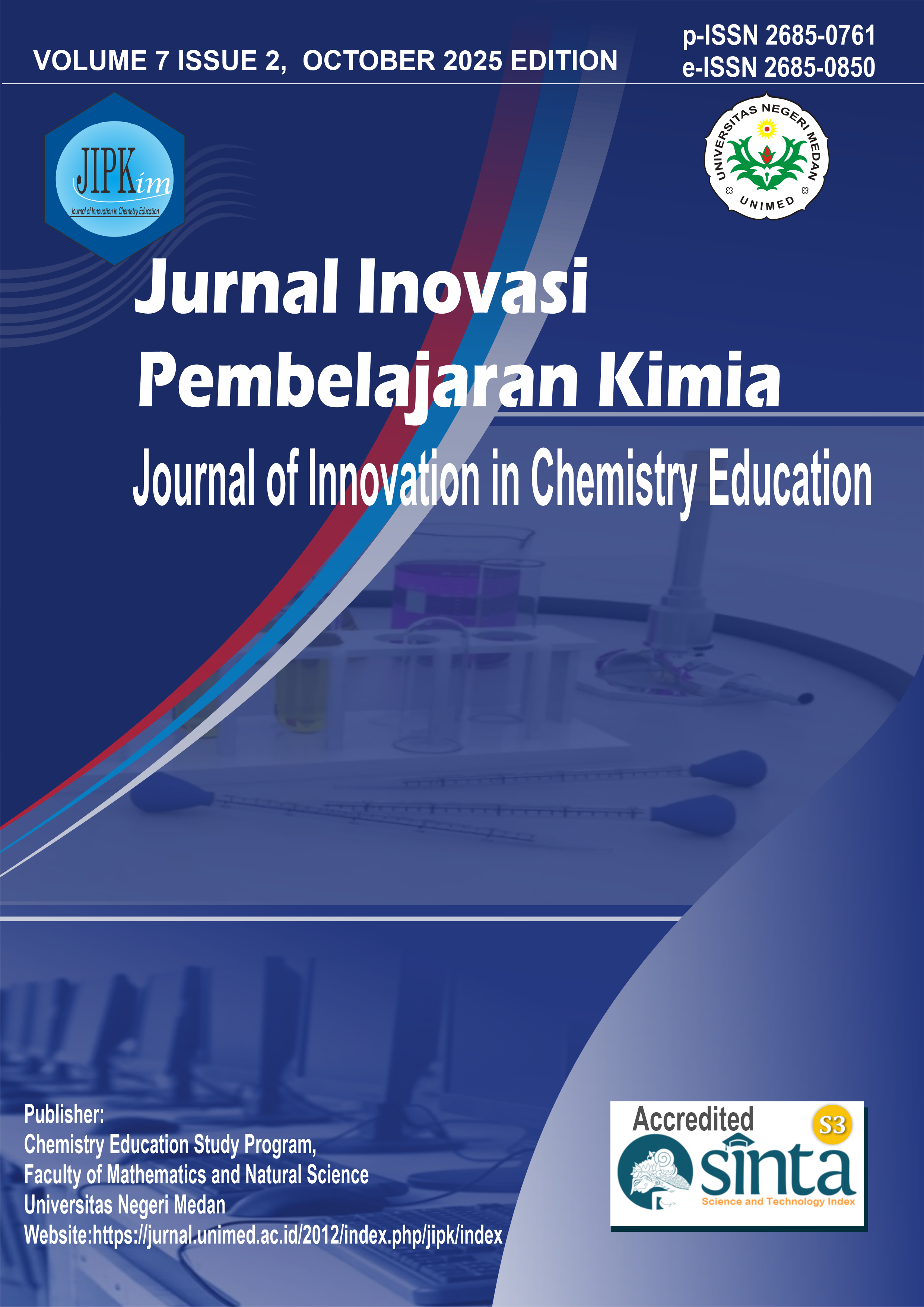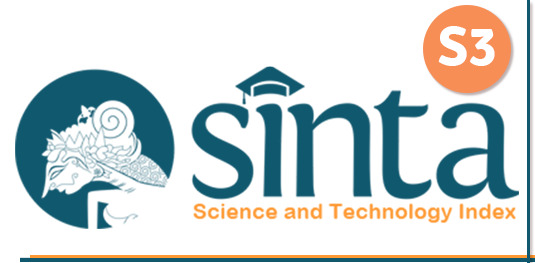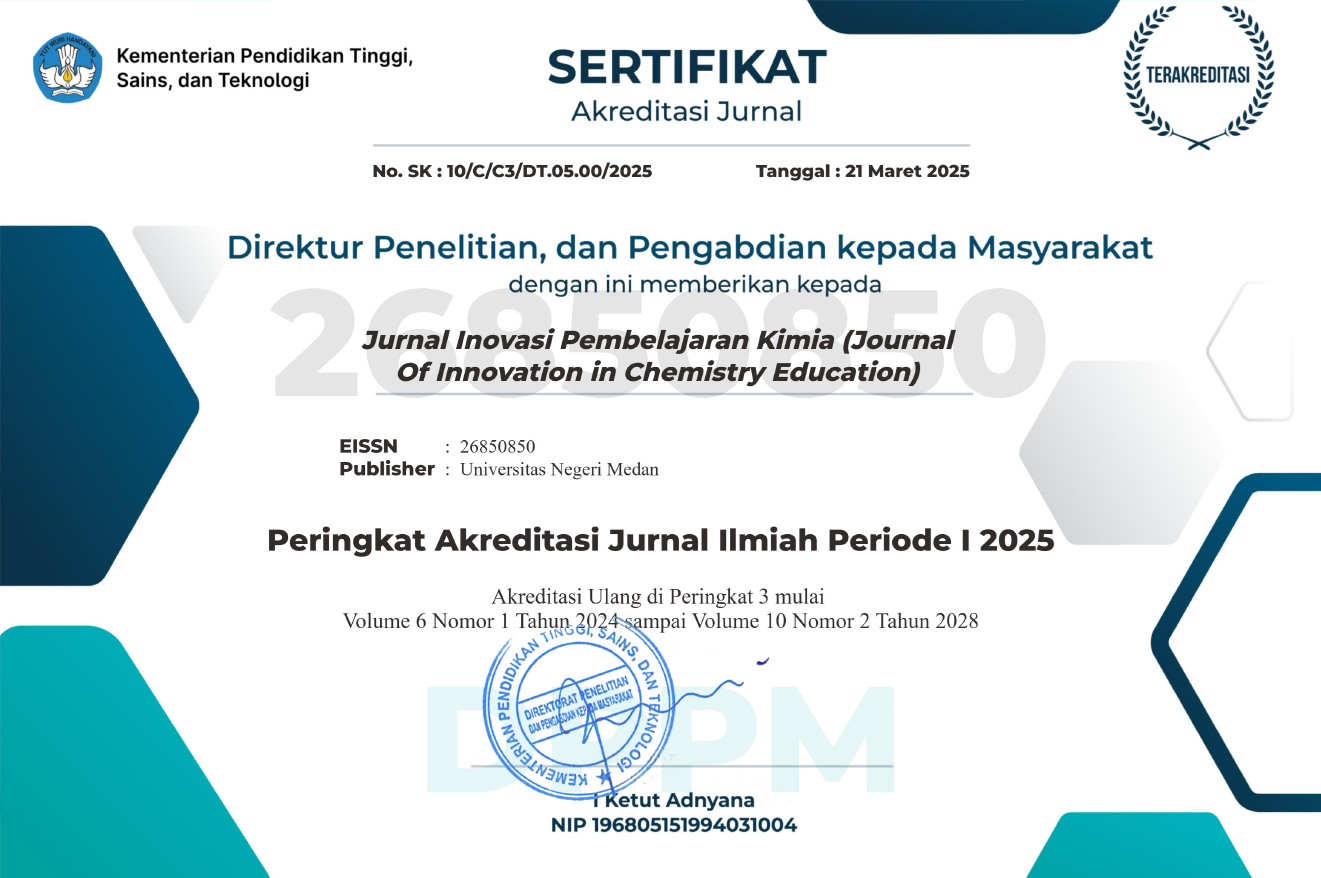Development of E-Module Discovery Learning Integrated Science Literacy by Kvisoft Flipbook Maker on Chemical Equilibrium
DOI:
https://doi.org/10.24114/jipk.v7i2.69652Keywords:
Discovery Learning, Science Literacy, Chemical Equilibrium, Student Learning Outcomes, e-moduleAbstract
Chemical equilibrium is an abstract concept illustrated by concrete examples requiring understanding of macro, submicroscopic, and symbolic levels and their interconnections. Observations at SMAN 2 Sidikalang show that learning still relies on textbooks, especially for chemical equilibrium, which limits student engagement and creativity due to minimal technology use. This research aims to obtain the development of an e-module Discovery Learning integrated science literacy by Kvisoft Flipbook Maker on chemical equilibrium to improve student learning outcomes and obtain positive responses from students. This research uses the type of Research and Development (R&D) using a 4D development model. The e-module developed was validated by material experts and media experts, consisting of 2 chemistry lecturers and 1 chemistry teacher. The results of this study are 1) The E-module was deemed highly valid, with average scores of 93.43% from material experts and 95.51% from media experts; 2) Students' response to the e-module was very positive with an average score percentage of 90.84%; 3) The increase in chemistry learning outcomes of students who are taught using e-modules is categorized as high marked by an N-Gain value of 0.84.References
Agustina, Auliah, A., & Hardin. (2023). Development of Handout Android-Based Application on Buffer Solution using Discovery Learning Model. Journal Of Innovation in Chemistry Education, 5(1), 17–7. https://doi.org/10.24114/jipk.v5i1
Fadhilah, M., & Nainggolan, B. (2024). The Influence of Problem Based e-Modules on Students’ Motivation and Learning Outcomes in Acid-Base Material. Journal of Innovation in Chemistry Education, 6(2), 203–210. https://doi.org/10.24114/jipk.v6i2
Greetings, & Kasmawati. (2023). Implementation of the Discovery Learning Method in Indonesian Language Learning Based on the Independent Curriculum: A Study on Diagnostic Assessment. In Journal of Education (Vol. 12, Issue 4). https://jurnaldidaktika.org849
Hamid, S. N. M., Lee, T. T., Taha, H., Rahim, N. A., & Sharif, A. M. (2021). E-Content Module For Chemistry Massive Open Online Course (Mooc): Development And Students' Perceptions. Journal of Technology and Science Education, 11(1), 67–92. https://doi.org/10.3926/jotse.1074
Helsy, I., & Andriyani, L. (2017). Development of teaching materials on chemical equilibrium materials oriented to multiple chemical representations. Journal of Chemical Engineering, 2(1), 104–108. https://doi.org/10.15575/jta.v2i1.1365
Hosnan. (2016). Scientific and Contextual Approaches in 21st Century Learning. Bogor: Ghalia Indonesia
Isnaini, N., Listiadi, A., & Subroto, W. T. (2022). Validity and Practicality of Contextual-Based E-Modules for OTK Subjects Facilities and Infrastructure for Students of the Office Governance Automation Expertise Program. Journal of Office Administration Education (JPAP), 10, 157–166. https://journal.unesa.ac.id/index.php/jpap
Istikomah, N., Relmasira, S. C., & Hardini, A. T. A. (2018). Application of the Discovery Learning Model in Social Studies Learning to Improve the Cognitive Learning Outcomes of Elementary School Students. Didactics of Dwija Indria, 6(3), 130–138.
Iwantoro, I., Rahmat, S., & Haris, A. (2022). Discovery Learning as an Innovation in Islamic Religious Education Learning Model After the Covid-19 Pandemic. JIE (Journal of Islamic Education), 7(2), 154. https://doi.org/10.52615/jie.v7i2.275
Lastri, Y. (2023). Development and utilization of e-module teaching materials in the learning process. Journal of Educational Imagery, 3(3), 1139–1146. https://doi.org/10.38048/jcp.v3i3.1914
Maharcika, A. A. M., Suarni, N. K., & Gunamantha, I. M. (2021). Development of Flipbook Maker-based Electronic Modules (e-modules) for the subtheme of work around me for grade IV Elementary / MI. Indonesian Journal of Basic Education, 5(2), 165–174.
Novili, W. I., Utari, S., Saepuzaman, D., & Karim, S. (2017). Application of Scientific Approach in an Effort to Foster Scientific Literacy in the Competency Domain and Knowledge Domain of Junior High School Students on Hot Topics. Journal of Physics Learning Research, 8(1), 57–63. http://journal.upgris.ac.id/index.php/JP2F
Nurwiatin, N. (2022). The Influence of Independent Learning Curriculum Development and Principal Readiness on Learning Adjustments in Schools. EDUSAINTEK: Journal of Education, Science and Technology, 9(2), 472–487. https://doi.org/10.47668/edusaintek.v9i2.537
Panggabean, F. T. M., Sari Munthe, G. W., Silitonga, P. M., Juniar, A., & Selly, R. (2022). Development of HOTS Integrated Problem Based Learning (PBL) Chemistry Learning Module on Buffer Solution Material at SMA Negeri 1 Purba. International Journal of Computer Applications Technology and Research, 11(08), 301–304. https://doi.org/10.7753/ijcatr1108.1001
Prasetyo, A. D., & Abduh, M. (2021). Increasing student learning activity through the discovery learning model in elementary schools. Journal of Basic Science, 5(4), 1717–1724. https://doi.org/10.31004/basicedu.v5i4.991
Priliyanti, A., Muderawan, I. W., & Maryam, S. (2021). Analysis of students' learning difficulties in learning chemistry class XI. Journal of Chemistry Education Undiksha, 5, 11–18. https://ejournal.undiksha.ac.id/index.php/JJPK
Rahmawati, D., Vahlia, I., Mustika, M., Yunarti, T., & Nurhanurawati, N. (2022). Validity Analysis of Development of Socrates-Based Linear Algebra E-Modules. Education Quarterly Reviews, 5(2). https://doi.org/10.31014/aior.1993.05.02.495
Ramli, M., Saridewi, N., Budhi, T. M., & Suhendar, A. (2022). CHEMISTRY FOR HIGH SCHOOL/MA CLASS XI. Ministry of Education, Culture, Research, and Technology. https://buku.kemdikbud.go.id
Roldy, C. F., Tumalun, N. K., & Tilaar, A. L. (2024). Pengembangan Bahan Ajar Menggunakan Kvisoft Flipbook Maker dan Geogebra Terintegrasi Pada Materi Program Linear. JRIP: Jurnal Riset Dan Inovasi Pembelajaran, 4(2), 1546–1561.
Suharyat, Y., Santosa, T. A., Zulysuri, Suhaimi, & Gunawan, R. G. (2023). Meta-Analysis: The Effect of Problem-Based Learning Based E-Modules on Students' Critical Thinking Skills in Science Learning in Indonesia, Universitas Pahlawan Tuanku Tambusai. Journal of Education and Counseling, 5, 5069–5076.
Sutrisna, N. (2021). Analysis of Science Literacy Ability of High School Students in Sungai TFull City. Journal of Research Innovation, 1(12), 2683–2694.
Wulansari, E. W., Kantun, S., & Suharso, P. (2018). Development of E-Module of Economics Learning Capital Market Material for Students of Class XI IPS Man 1 Jember Academic Year 2016/2017. Hurnal Pendidikan Ekonomi: Scientific Journal of Education, Economics and Social Sciences, 12(1). https://doi.org/10.19184/jpe.v12i1.6463
Yunsyahana, F., Auliah, A., & Djangi, M. J. (2022). Keefektifan Model Pembelajaran Discovery Learning Terhadap Hasil Belajar Peserta Didik Kelas X MAN Bantaeng. Journal Of Innovation in Chemistry Education, 92–100. https://doi.org/10.24114/jipk
Zuraini, Winarni, S., & Hanum, L. (2023). Kemampuan Peserta Didik dalam Memahami Representasi Makroskopik, Submikroskopik, dan Simbolik Materi Larutan Elektrolit dan Non Elektrolit. Jurnal Ilmiah Mahasiswa Jurusan Pendidikan Kimia (JIMPK), 8(1), 1–12.













